BMW X1 vs Mitsubishi Eclipse Cross - Differences and prices compared
Compare performance (326 HP vs 218 HP), boot space and price (38200 £ vs 41100 £ ) at a glance. Find out which car is the better choice for you – BMW X1 or Mitsubishi Eclipse Cross?
Costs and Efficiency:
Looking at overall running costs, both models reveal some interesting differences in everyday economy.
BMW X1 has a minimal advantage in terms of price – it starts at 38200 £ , while the Mitsubishi Eclipse Cross costs 41100 £ . That’s a price difference of around 2906 £.
As for electric range, the Mitsubishi Eclipse Cross performs decisively better – achieving up to 635 km, about 554 km more than the BMW X1.
Engine and Performance:
Under the bonnet, it becomes clear which model is tuned for sportiness and which one takes the lead when you hit the accelerator.
When it comes to engine power, the BMW X1 has a distinct edge – offering 326 HP compared to 218 HP. That’s roughly 108 HP more horsepower.
In acceleration from 0 to 100 km/h, the BMW X1 is decisively quicker – completing the sprint in 5.40 s, while the Mitsubishi Eclipse Cross takes 7.90 s. That’s about 2.50 s faster.
In terms of top speed, the BMW X1 performs noticeable better – reaching 233 km/h, while the Mitsubishi Eclipse Cross tops out at 170 km/h. The difference is around 63 km/h.
There’s also a difference in torque: BMW X1 pulls evident stronger with 477 Nm compared to 300 Nm. That’s about 177 Nm difference.
Space and Everyday Use:
Cabin size, boot volume and payload all play a role in everyday practicality. Here, comfort and flexibility make the difference.
Both vehicles offer seating for 5 people.
In terms of boot space, the BMW X1 offers slight more room – 540 L compared to 487 L. That’s a difference of about 53 L.
In maximum load capacity, the Mitsubishi Eclipse Cross performs hardly perceptible better – up to 1670 L, which is about 125 L more than the BMW X1.
Who comes out on top?
Overall, the Mitsubishi Eclipse Cross shows itself to be edges out slightly and secures the title of DriveDuel Champion.
It convinces with the more balanced overall package and proves to be the more versatile choice for everyday use.
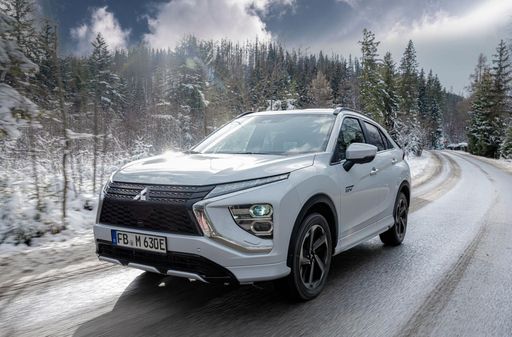
Mitsubishi Eclipse Cross
Costs and Consumption
View detailed analysis
Engine and Performance
View detailed analysis
Dimensions and Body
View detailed analysis
BMW X1
The BMW X1 brings a premium feel to compact crossover life, wrapping practical space and agile handling into a tidy, upscale package. It’s ideal for buyers who want BMW driving dynamics without the bulk, offering everyday comfort and a few clever tricks to keep the commute interesting.
details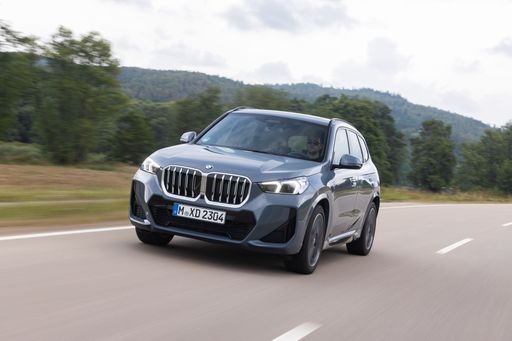
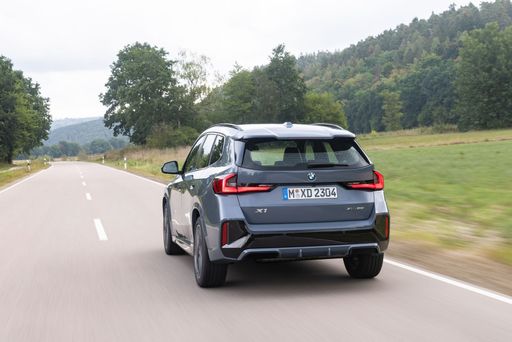
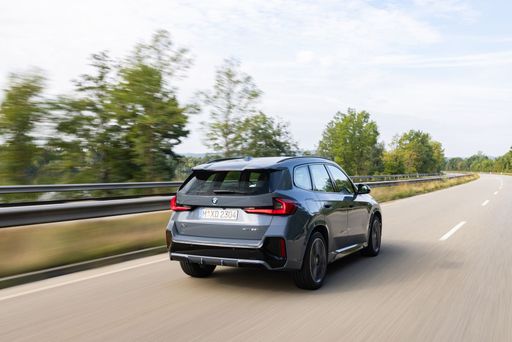
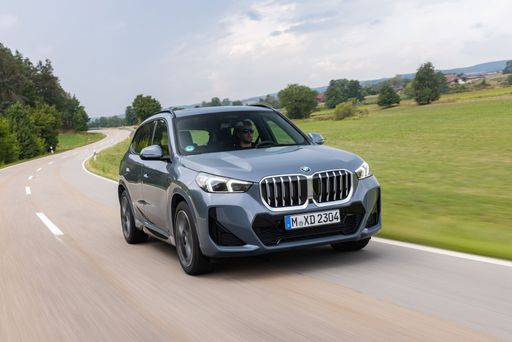
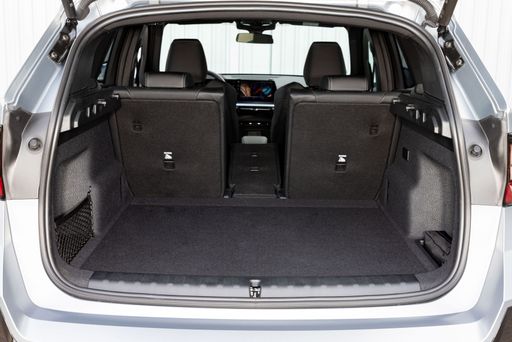
Mitsubishi Eclipse Cross
Mitsubishi Eclipse Cross combines coupe-like looks with crossover practicality, so you get style without the showroom attitude. It’s an affable daily driver that hides a few quirks behind a confident grin, making it an easy pick for buyers who want personality without fuss.
details
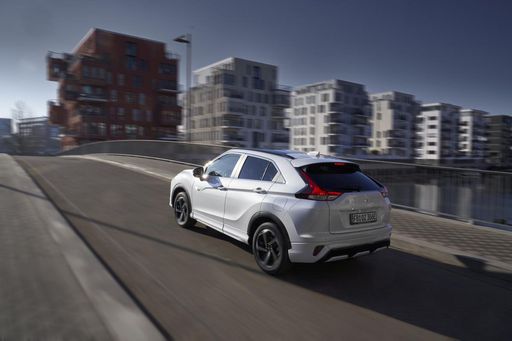
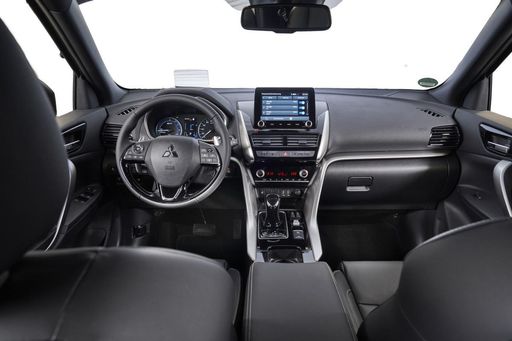
Costs and Consumption |
|
|---|---|
|
Price
38200 - 55500 £
|
Price
41100 - 48200 £
|
|
Consumption L/100km
2.5 - 7.7 L
|
Consumption L/100km
-
|
|
Consumption kWh/100km
-
|
Consumption kWh/100km
16.7 - 16.9 kWh
|
|
Electric Range
81 km
|
Electric Range
635 km
|
|
Battery Capacity
14.20 kWh
|
Battery Capacity
-
|
|
co2
57 - 175 g/km
|
co2
0 g/km
|
|
Fuel tank capacity
47 - 54 L
|
Fuel tank capacity
-
|
Dimensions and Body |
|
|---|---|
|
Body Type
SUV
|
Body Type
SUV
|
|
Seats
5
|
Seats
5
|
|
Doors
5
|
Doors
5
|
|
Curb weight
1575 - 1935 kg
|
Curb weight
-
|
|
Trunk capacity
490 - 540 L
|
Trunk capacity
487 L
|
|
Length
4500 mm
|
Length
4489 mm
|
|
Width
1845 mm
|
Width
1908 mm
|
|
Height
1630 - 1642 mm
|
Height
1571 mm
|
|
Max trunk capacity
1495 - 1545 L
|
Max trunk capacity
1670 L
|
|
Payload
490 - 500 kg
|
Payload
-
|
Engine and Performance |
|
|---|---|
|
Engine Type
Diesel MHEV, Petrol MHEV, Petrol, Diesel, Plugin Hybrid
|
Engine Type
Electric
|
|
Transmission
Automatic
|
Transmission
Automatic
|
|
Transmission Detail
Dual-Clutch Automatic
|
Transmission Detail
Reduction Gearbox
|
|
Drive Type
Front-Wheel Drive, All-Wheel Drive
|
Drive Type
Front-Wheel Drive
|
|
Power HP
136 - 326 HP
|
Power HP
218 HP
|
|
Acceleration 0-100km/h
5.4 - 9.2 s
|
Acceleration 0-100km/h
7.90 s
|
|
Max Speed
190 - 233 km/h
|
Max Speed
170 km/h
|
|
Torque
230 - 477 Nm
|
Torque
300 Nm
|
|
Number of Cylinders
3 - 4
|
Number of Cylinders
-
|
|
Power kW
100 - 240 kW
|
Power kW
160 kW
|
|
Engine capacity
1499 - 1998 cm3
|
Engine capacity
-
|
General |
|
|---|---|
|
Model Year
2024 - 2025
|
Model Year
2025
|
|
CO2 Efficiency Class
D, E, F, B
|
CO2 Efficiency Class
A
|
|
Brand
BMW
|
Brand
Mitsubishi
|
Is the BMW X1 offered with different drivetrains?
The BMW X1 is offered with Front-Wheel Drive or All-Wheel Drive.




